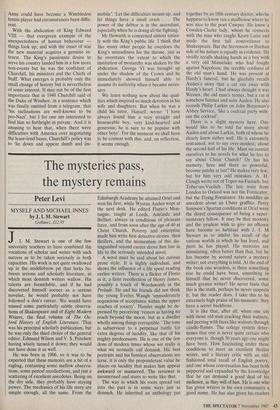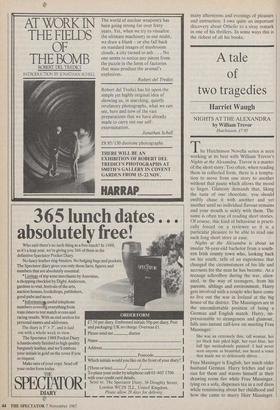The mysteries pass, the mystery remains
Peter Levi
MYSELF AND MICHAEL INNES by J. I. M. Stewart Gollancz, £12.95 J. I. M. Stewart is one of the few university teachers to have combined the vocations of scholar and writer with such success as to be taken seriously in both capacities. His work is not quite swallowed up in the middlebrow pit that lurks be- tween serious and scholarly literature, in which most donnish writers wallow. His talents are formidable, and if he had discovered himself sooner as a serious novelist, he would probably not have followed a don's career. We would have missed some particularly subtle observa- tions of Shakespeare and of Eight Modern Writers, the final volume of The Ox- ford History of English Literature. That was his principal scholarly publication, but he was only the third choice of the general editor, Edmund Wilson and V. S. Pritchett having wisely turned it down; they would not have done it as well.
He was born in 1906, so it was to be expected that these memoirs are a bit of a ragbag, containing some mellow observa- tions, some period recollections, and just a scattering of excellent anecdotes. Being on the dry side, they probably have staying power. The mechanics of his life story are simple enough, all the same. From the Edinburgh Academy he attained Oriel and won his first, while Wystan Auden wept at the next desk. He edited Florio's Mon- taigne, taught at Leeds, Adelaide and Belfast, always in conditions of pleasant farce, and from soon after the age of 40 at Christ Church. Poverty and enterprise made him write first detective stories, then thrillers, and the momentum of this dis- tinguished second career drove him late in life to the seriously intended novel.
A word must be said about his curious prose style. It is highly individual, and shows the influence of a life spent reading earlier writers. There is a flicker of Florio in it, a faint recollection of Henry James, possibly a touch of Wordsworth in the Prelude. He and his friends did not think the young Evelyn Waugh 'immoderately sequacious of acceptance within the upper reaches of society'. Hamlet might be de- pressed by perceiving 'reason as having no reach beyond the moon, but as a dweller wholly among things corruptible.' The tone is subservient to a perpetual battle for extra degrees of lucidity, like that of his mighty predecessors. He is one of the few dons of modern times whose wit really is what we normally call donnish. His best portraits and his funniest observations are terse, it is only the preponderant value he places on lucidity that makes him appear awkward or mannered. The reviewer is mesmerised and starts to write like that.
The way in which his roots spread out into the past is in some ways just as donnish. He inherited an anthology put together by an 18th-century doctor, who he happens to know ran a madhouse where he was nice to the poet Cowper. He knew a Cowden-Clarke lady, whom he connects with the man who taught Keats Latin and made the first full concordance to Shakespeare. But the Stevenson or Buchan side of his nature is equally in evidence. He vividly recalls shaking hands as a boy with a very old Mameluke who had fought against Napoleon: the terrible coldness of the old man's hand. He was present at Hardy's funeral, but he gleefully recalls Auden's story that a cat ran away with Hardy's heart. I had always thought it was Wessex, the old man's terrier, but a cat is somehow funnier and suits Auden. He also records Philip Larkin on John Betjeman's Abbey Service, 'like a cocktail party with- out the cocktail'.
There is a slight mystery here. One would like to be told far more about Auden and about Larkin, both of whom he clearly knew rather well. He is extremely restrained, not to say over-modest, about the second half of his life. Must we restrict ourselves to his novels for what he has to say about Christ Church? Or has his memory, here and there so powerful, become patchy at last? He makes very few, but for him very odd mistakes. A. H. Clough wrote not of Toper-na-Fuosich, but Tober-na-Vuolich. The late train from London to Oxford was not the Fornicator, but the Flying Fornicator. He muddles an anecdote about an Ulster graffito. Percy Simpson's Spartan conditions at Oriel were the direct consequence of being a super- numerary fellow. It may be that modesty and the prudent wish to give no offence have become so habitual with J. I. M Stewart as to inhibit his recall of the various worlds in which he has lived, and parts he has played. His memoirs are stimulating, often better than that, but he has become by second nature a mystery writer: not everything is told. At the end of the book one wonders, is there something else he could have been, something in himself that he never discovered, some much greater writer? He never hints that this is the truth, perhaps he never suspects it, but the reader does. I take this to be extremely high praise of his memoirs: they have a secret backbone.
It is like that, after all, when one sits with those old men cracking their walnuts, and peering with faces like walnuts through candle-flames. The college system deter- mines that one is never quite certain who everyone is, though 50 years ago one might have been. How fascinating under these conditions to meet an excellent thriller writer, and a literary critic with an old- fashioned total recall of English poetry, and one whose conversation has been both peppered and expanded by the knowledge that he can demand a good deal of his audience, as they will of him. He is one who has given writers in his own community a good name. He has also given his readers many afternoons and evenings of pleasure and instruction. I owe quite an important discovery about Othello to a stray remark in one of his thrillers. In some ways this is the richest of all his books.



































































 Previous page
Previous page